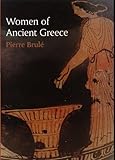Women of Ancient Greece / Pierre Brulé.
Material type: TextPublisher: Edinburgh : Edinburgh University Press, [2022]Copyright date: ©2003Description: 1 online resource (320 p.)Content type:
TextPublisher: Edinburgh : Edinburgh University Press, [2022]Copyright date: ©2003Description: 1 online resource (320 p.)Content type: - 9780748616435
- 9780748679843
- 938.0082 22
- HQ1134 .B78 2003
- online - DeGruyter
| Item type | Current library | Call number | URL | Status | Notes | Barcode | |
|---|---|---|---|---|---|---|---|
 eBook
eBook
|
Biblioteca "Angelicum" Pont. Univ. S.Tommaso d'Aquino Nuvola online | online - DeGruyter (Browse shelf(Opens below)) | Online access | Not for loan (Accesso limitato) | Accesso per gli utenti autorizzati / Access for authorized users | (dgr)9780748679843 |
Frontmatter -- Contents -- Publisher's Acknowledgement -- Prologue: Which paths will lead us to them? -- 1 The feminine and the sacred -- 2 Women of the epics -- 3 On the body and sexuality -- 4 Joys and miseries of married life -- 5 The woman in the 'house' -- 6 The women on the outside -- Epilogue: How shall we take our leave of them? -- Bibliography -- Index of Classical Authors -- General Index
restricted access online access with authorization star
http://purl.org/coar/access_right/c_16ec
Pierre Brulé's brilliant evocation of how women lived in ancient Greece describes every aspect of their lives, including their religious, familial and domestic duties, their economic importance, and their social, moral and legal status as wives, cohabitees or slaves. He examines their sexual roles, what the status of a woman's body was and what her own and others' attitudes were likely to be towards it. Professor Brulé does all this in the context of the development and achievements of Greek civilisation.Women appear not to have been highly regarded in ancient Greece, with female infanticide a common practice. Strains of misogyny can be heard in Greek literature, drama and philosophy: 'The most unintelligent people in the world' is how one character refers to women in Plato's Symposium (which also features Diotima, his best-known female sage). Women had few duties beyond the home, and the evidence that they existed at all is tantalisingly small. Yet by piecing together fragments and clues, the author gives us a vivid account of women's lives in Greece 2,500 years ago.Pierre Brulé's deft scholarship and engaging style make this fascinating history always readable, sometimes moving, and often entertaining.
Mode of access: Internet via World Wide Web.
In English.
Description based on online resource; title from PDF title page (publisher's Web site, viewed 29. Jun 2022)


